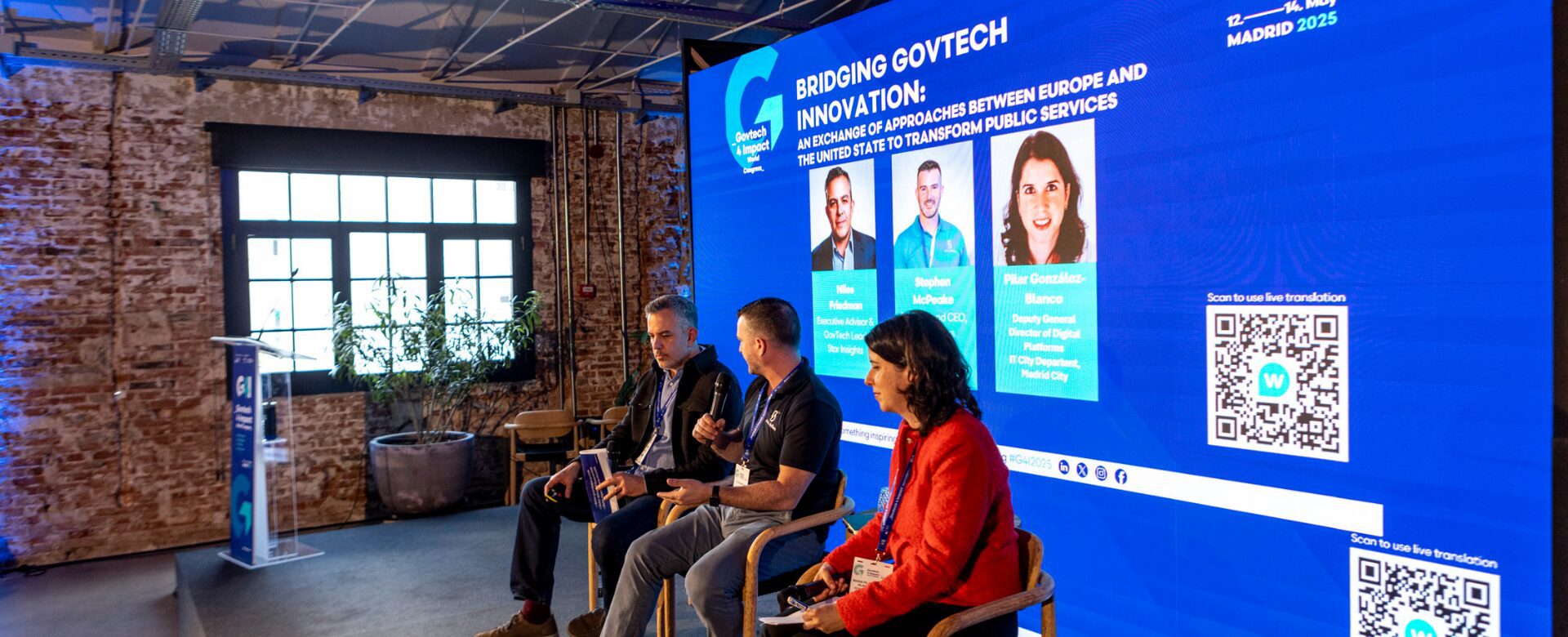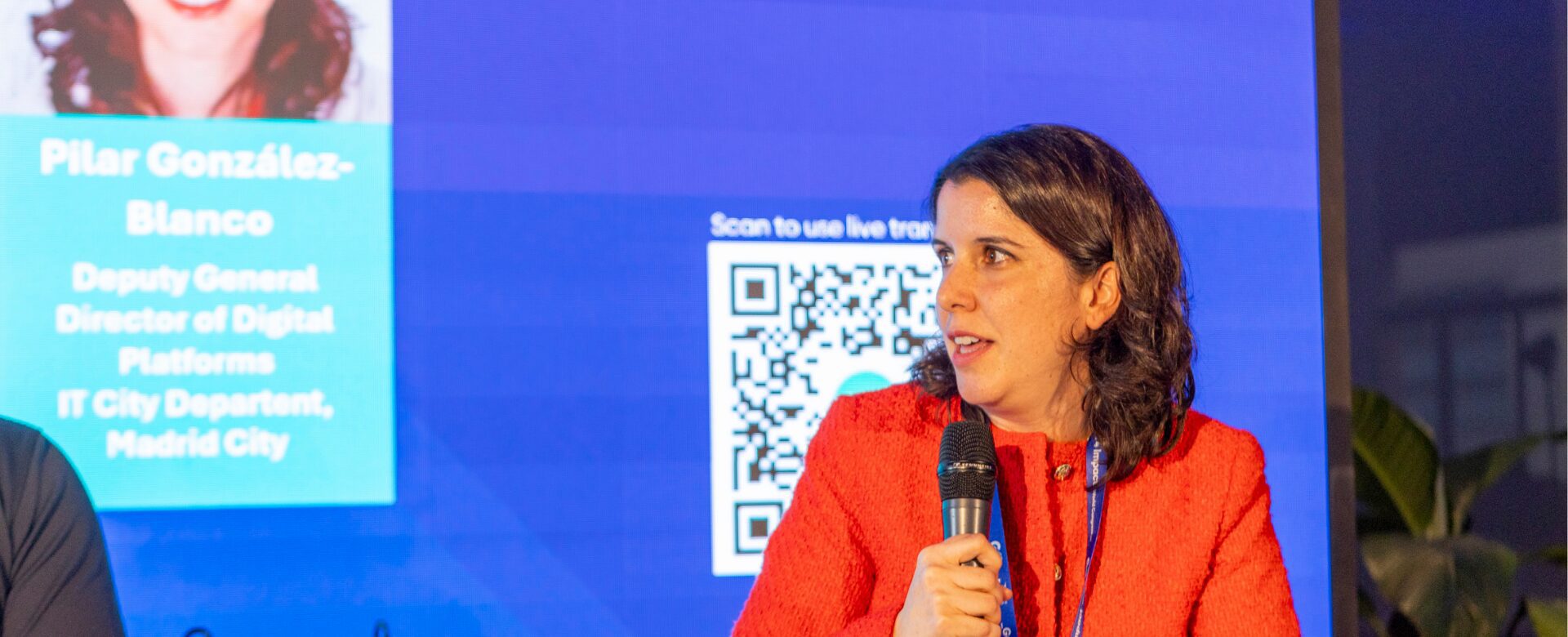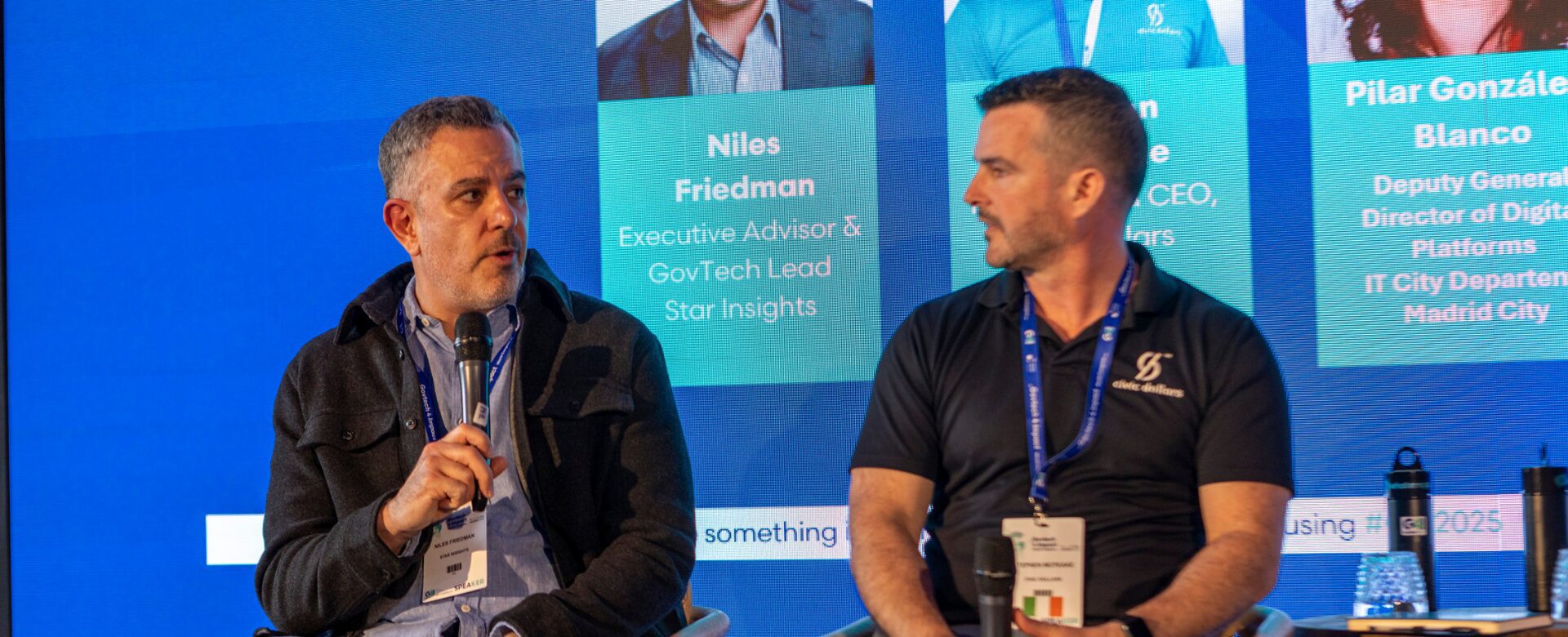Bridging GovTech Innovation
An Exchange of Approaches Between
Europe and the United States to
Transform Public Services
Insights from Niles Friedman,
Stephen McPeake, and
Pilar González-Blanco
Bridging GovTech Innovation
The interactive session on “Bridging GovTech Innovation” explored the evolving role of GovTech in transforming public services across Europe and the United States. The session, moderated by Niles Friedman, Executive Advisor & GovTech Lead at Star Insights, delved into the importance of collaboration between the two regions and highlighted the challenges and successes that come with scaling innovative solutions in the public sector. Joining Niles were Stephen McPeake, Founder & CEO of CivicDollars, and Pilar Gonzalez-Blanco, Deputy Director General of Digital Platforms at Madrid City Council.
The session covered key aspects such as citizen engagement, procurement processes, data protection, and the collaboration between the public and private sectors. The discussion offered a practical look at how cities and governments are adopting technology to improve public services and address pressing challenges such as healthcare, well-being, community engagement, and smart cities.

Bridging Two Continents for Public Service Innovation
The session kicked off with Niles Friedman setting the stage for a dialogue between Europe and the United States on how GovTech is transforming public services. He noted that the session would focus on shared approaches and practices while also looking at the unique challenges both regions face. “We want to talk about what makes an ideal government environment for GovTech initiatives, projects, and startups to be successful,” he said. Niles emphasized the importance of creating collaborative environments that can help GovTech startups scale and thrive within government structures.
One key discussion point was the difference in how Europe and the United States define the relationship between citizens and the government. While Europe talks about citizens, in the United States, residents often access government services, even if they are not yet full citizens. This distinction leads to differences in how technology is applied and how services are tailored for diverse populations.
CivicDollars: Empowering Communities through Innovation
Stephen McPeake shared the story of CivicDollars, a community currency platform designed to promote public health and well-being by incentivizing outdoor activities. The idea, developed during the COVID-19 lockdown, offers people Civic Dollars for spending time in parks and public spaces. These Civic Dollars can be spent at local businesses or donated to community organizations. “We want people to spend time outdoors, earn Civic Dollars, and then use them to support local businesses and community causes,” Stephen explained.
Stephen’s initiative has already been implemented in Belfast, Dublin, Copenhagen, and Myrtle Beach, South Carolina, with plans to expand further. His project is a great example of how GovTech can improve community engagement, promote health and well-being, and boost the local economy. CivicDollars is working across sectors, touching on health, local economies, and even tourism, proving that GovTech solutions can have wide-reaching impacts.
Madrid’s Digital Transformation: Citizen-Centered Technology
Pilar Gonzalez-Blanco presented the digital transformation efforts in Madrid, where the city has aligned its strategy with the EU’s Horizon 2030 vision for climate-neutral, hyper-connected cities. Pilar shared that Madrid City Council is focused on putting technology at the service of citizens, with a clear goal to use digital tools to improve the daily lives of residents. “Our goal now is to innovate and use technology for better services for our citizens, not just technology for the sake of it,” Pilar said.
She also discussed the city’s approach to rolling out 5G infrastructure, which aims to enhance sanitary services, improve connectivity, and create smart urban spaces. Madrid is deploying these advanced technologies while focusing on how to make them accessible and beneficial for everyone, especially vulnerable populations. As Pilar put it, “We’re deploying 5G to enhance sanitary services and reach the final citizen.”

Navigating Procurement: Overcoming Barriers to Scaling Innovation
A central theme of the conversation was the challenge of procurement. Stephen McPeake pointed out that startups often struggle with traditional procurement processes, which are usually slow and inflexible. He noted, “It’s difficult to scale because many government programs only last for three to six months, and startups struggle with short-term engagements.” This challenge is particularly acute when it comes to getting approval for projects that can have a broad impact across cities.
One solution discussed was challenge-based procurement, a practice that has gained traction in the United States. In this model, governments issue challenges around specific issues, such as homelessness or public health, and invite startups to submit solutions. Challenge-based procurement allows for greater diversity in how startups engage with government contracts and encourages innovative solutions to public problems. Through his work on numerous challenge-based procurement initiatives with Los Angeles County and the State of Washington, Niles has seen how this approach puts the government’s needs first and expands the diversity of solutions available to those leaders and teams, while positively changing the culture in government to be more innovative. As Niles explained, “Proof of concept programs are important, but the real question is, how do you scale that?”
Citizen Engagement: Putting People First in GovTech
Both Niles Friedman and Pilar Gonzalez-Blanco emphasized the importance of citizen and resident engagement in GovTech. Pilar shared that Madrid City Council is continually looking for ways to engage citizens through digital tools, ensuring that technology serves the needs of the public. She remarked, “Our goal is to make technology serve the citizens, not the other way around.” This human-centered approach is critical for ensuring the success of any GovTech initiative, as it aligns technology with the real-world needs of residents.
For Stephen, CivicDollars is all about engaging communities and improving quality of life. His platform encourages outdoor activity, fosters community engagement, and supports local businesses – all of which contribute to a healthier, more connected society. As he noted, “Without community support, any innovation is likely to fail. It’s essential to work with citizens and get their buy-in.”

Data Protection: Navigating GDPR Compliance
As GovTech projects scale, data protection becomes a key concern, particularly when moving across borders. Stephen McPeake shared that CivicDollars faced challenges when expanding into Europe, particularly around GDPR compliance. However, by ensuring that their platform adhered to GDPR regulations, CivicDollars was able to smoothly scale across multiple cities in Europe and the United States. “GDPR compliance was a real showstopper for us at the beginning, but once we got it right, we were able to scale across multiple cities,” Stephen explained.
Pilar Gonzalez-Blanco added that data protection is a priority for Madrid, and any technology adopted by the city must meet GDPR standards. She highlighted that these regulations offer strong citizen protection, and privacy must be embedded in all digital solutions deployed by the city. Pilar stated, “Data protection is a top priority for us, and it’s embedded in every digital project we undertake.”
Public-Private Collaboration: Driving Innovation Forward
The session concluded with a strong emphasis on the importance of collaboration between the public and private sectors. Pilar discussed how Madrid has fostered innovation through partnerships with universities, startups, and the private sector, helping to drive the city’s digital transformation. “The key is public-private collaboration. We cannot do this alone,” Pilar stated.
Stephen McPeake also emphasized that for GovTech to succeed, community engagement is crucial. He noted, “Without community support, any innovation is likely to fail. It’s essential to work with citizens and get their buy-in.” Both agreed that collaboration and a human-centered approach are key to scaling and sustaining GovTech innovations.
Key Takeaways: Innovating the Public Sector Through Technology
This insightful panel demonstrated that effective governance in the digital age involves far more than mere adoption of emerging technologies – it requires innovative governance models, bold leadership, and genuine collaboration between the public and private sectors:
- Citizen and Resident-Centric Innovation: Tech adoption must prioritize human needs, enhancing real-life experiences for citizens and residents.
- Democratic Imperative: Technology strengthens democracy by making public services more transparent, accessible, and accountable.
- Mindset Transformation: Successful digitalization demands rethinking processes from the ground up, emphasizing meaningful impact over technology alone.
- Sustainable Public Infrastructure: DPI and interoperability emerge as central pillars for creating inclusive and equitable digital public services.
The panelists – Niles Friedman, Stephen McPeake, and Pilar Gonzalez-Blanco, concluded with a shared vision: Governments have an extraordinary opportunity, and indeed a responsibility, to leverage technology to build stronger, more inclusive societies. Their compelling message resonated throughout G4I 2025, emphasizing that the future of governance lies not merely in technology itself, but in how governments use it to uplift their citizens.
As Niles Friedman aptly put it, “If we make digital public services not only efficient but enjoyable, then we’ve truly succeeded.”
